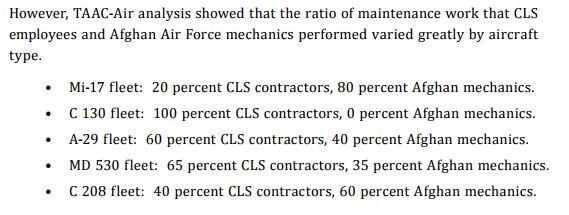The Afghan Air Force must start maintaining its own aircraft and stop relying on contractors hired by coalition forces, according to a report by the Defense Department Inspector General.
The contracts “limit the progressive transfer of maintenance responsibilities to Afghan Air Force maintainers,” the report states, adding that the existing Contractor Logistic Support agreements don’t contain plans or timelines to transition maintenance operations to the Afghans.
According to the DoD IG report, the CLS contracts were responsible for 80 percent of the maintenance work conducted, while Afghan mechanics only conducted the remaining 20 percent. This distribution of workload was the inverse of the coalition’s “stated aspirational goal,” the report said.
In fact, the current contracts will only “prolong Afghan dependence ... and delay the transfer of aircraft-related maintenance responsibility to Afghan Air Force personnel,” the report says.
The contracts also reduce Afghan Air Force maintainers’ training opportunities and delay the Afghans from establishing their own maintenance capabilities, according to the report.

When NATO’s International Security Assistance Force transitioned to a support role, “the coalition limited combat sorties and general aviation support to the [Afghan National Defense and Security Forces] to special circumstances,” the report reads. “However, Afghan Air Force support functions, such as maintenance and logistics, could not sustain air operations in support of Afghan-led operations.”
In order to fill this gap, Train, Advise and Assist Command-Air and the U.S. Army and U.S. Air Force program offices established contracts to sustain the Afghan Air Force while its maintainers continued to learn and train, according to the report.
However, as the CLS contracts are currently written, each of the vendors was allowed to develop its own transition and training plan to develop qualified Afghan mechanics.
“Of all five CLS contracts supporting Afghan Air Force airframes, only the contract covering the Mi‑17 defined transition criteria or identified transition timelines,” the report reads.
For the Afghan C-130s, the contract even contains a clause requiring a mechanic to have credentials from the U.S. Federal Aviation Administration.
“Current implementation of this contract clause continues to result in CLS contractors performing 100 percent of the maintenance, despite the presence of 45 trained and qualified Afghan mechanics,” the report reads.
Some policies, however, were singled out by the DoD IG as useful and worth replicating.
One was a 24-hour, Afghan-only maintenance period once a week, implemented by the commanding general of TAAC-Air.
“TAAC‑Air, in conjunction with the A‑29 contractor, coordinated the Afghan-only maintenance day to occur on the contractor’s required day-off,” the report said.
Kyle Rempfer was an editor and reporter who has covered combat operations, criminal cases, foreign military assistance and training accidents. Before entering journalism, Kyle served in U.S. Air Force Special Tactics and deployed in 2014 to Paktika Province, Afghanistan, and Baghdad, Iraq.





